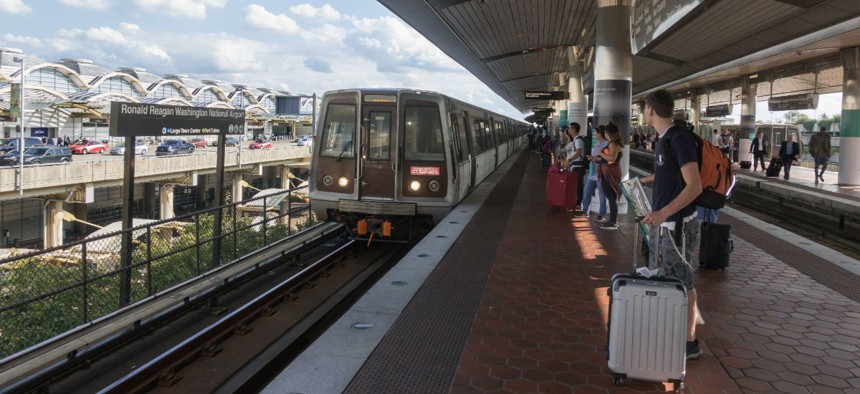
Metro stations south of National Airport are closed for the summer for platform improvements. By bakdc / Shutterstock.com
Some Agencies Reluctant to Offer Telework Amid D.C. Metro Disruption
The Office of Personnel Management directed agencies to encourage the practice during the summer closures of half a dozen Virginia Metrorail stations.
More than two weeks into the Washington Metropolitan Area Transportation Authority’s three-month long closure of six Metrorail stations to reconstruct outdoor platforms, federal agencies in the D.C. area have taken varying steps to offer telework and other workplace flexibilities for affected employees.
Between Memorial Day and Sept. 8, WMATA has shut down all Blue and Yellow line stations south of National Airport. The closures represent the first phase in a three-year plan to rebuild 20 outdoor Metrorail stations.
Last month, the Office of Personnel Management issued guidance to agencies encouraging officials to allow affected employees to temporarily expand their use of telework, alternative work schedules and other flexibilities.
But some agencies, where employees have seen their ability to telework drastically reduced over the last year, have either seemingly ignored the memo or implemented it in ways that continue to discourage working remotely.
National Treasury Employees Union National President Tony Reardon told Government Executive that the Health and Human Services Department has not issued any formal guidance to employees at its headquarters in Washington, D.C. And one office—the Office of the Assistant Secretary for Health—actually implemented a cut in available telework for employees, as mandated by the Federal Service Impasses Panel, the same week that the station closures began.
“The Office of the Assistant Secretary for Health notified NTEU that effective in the pay period beginning May 26, employees would be limited to one day of telework per week, regardless of their previous telework agreements,” Reardon said. “The decision by OASH leaders to pursue the most limited telework policy possible is both illegal and unfortunate, especially for a workforce that has demonstrated that telework is an effective tool to improve productivity and recruit and retain skilled employees.”
NTEU contended that efforts to implement the provisions of the impasses panel decision are not legal, because several provisions of the union and agency's collective bargaining agreement remain under negotiation. An HHS spokesperson said in a statement that although the department has not issued a formal policy change in light of the OPM guidance on flexibility during Metro station closures, supervisors have been empowered to offer flexibilities to their employees as needed.
“HHS is complying with the U.S. Office of Personnel Management’s request to allow affected employees to utilize various workplace flexibilities throughout the upcoming Platform Improvement Project,” the spokesperson said. “There is not an agency-wide proposal; however, supervisors are implementing workplace flexibilities appropriate to meeting their specific mission needs.”
The Agriculture Department, which last year also limited all telework agreements to one day per week, has taken several steps to provide employees flexibility over the summer. But expanded telework is not among them.
According to an internal Agriculture memo obtained by Government Executive, USDA managers are encouraged to allow employees to use alternative work schedules—either coming in and leaving early to avoid traffic, or condensing their work week into fewer days—and to authorize leave for employees.
“Managers are responsible for working with employees to establish or modify work schedules, and to adjust leave plans in accordance with [an] individual agency’s policies and procedures, if needed, to fulfill their responsibilities,” the memo stated. “Managers are encouraged to be flexible in considering adjustments to work schedules as well as the use of leave to address commuting disruptions.”
Despite the broad latitude with most workplace flexibilities, the memo remained firm on discouraging employees from working remotely more than one day per week.
“Because the Metro platform improvement project is temporary, changes to core telework agreements are not anticipated,” the memo stated. “USDA’s telework directive remains in effect and no changes to USDA’s telework policy are being made. USDA’s telework directive envisions situations where situational telework may be required, but these should be rare.”
The Agriculture Department did not respond to multiple requests for comment.
Over at the Education Department, a spokesperson for the American Federation of Government Employees, which represents employees there, said leadership has not responded to a demand to bargain over the implementation of the OPM guidance. But an Education spokesperson said the department is using existing authority vested in managers to authorize “episodic” telework requests by the roughly 200 workers impacted by the station closures.
“The current policy already provides managers with the flexibility to approve episodic requests on rare occasions, so there is no need to provide any additional policy exceptions,” the spokesperson said.
Union officials reported that other agencies have been more than willing to accommodate employees during the Metro closures.
“We are pleased to see the Nuclear Regulatory Commission take proactive steps to help employees adjust their schedules to accommodate the disrupted commute,” Reardon said. “NRC leaders, following guidance from OPM, are encouraging employees to request new scheduling flexibilities, including an increased amount of telework, and they are encouraging supervisors to grant those requests.”
NTEU has also reached an agreement with the U.S. Patent and Trademark Office to expand telework temporarily for employees affected by the station closures.
NEXT STORY: Union Organizers Score Another Win at USDA







